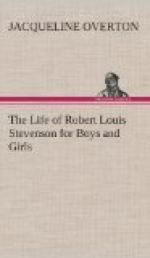It was translated into many different languages, even appearing serially in certain Greek and Spanish papers.
“Kidnapped” followed; a story founded on the Appan murder. David Balfour, the hero, was one of his own ancestors; Alan Breck had actually lived, and the Alison who ferried Alan and David over to Torryburn was one of Cummie’s own people. The Highland country where the scenes were laid, he had traversed many times, and the Island of Earraid, where David was shipwrecked, was the spot where he had spent some of his engineering days.
Stevenson had often said the “brownies” in his dreams gave him ideas for his tales. At Skerryvore they came to him with a story that among all his others is counted the greatest.
“In the small hours one morning,” says his wife, “I was awakened by cries of horror from Louis. Thinking he had a nightmare I awakened him. He said angrily, ’Why did you wake me? I was dreaming a fine bogey tale.’”
The dream was so vivid that he could not rest until he had written off the story, and it so possessed him that the first draft was finished within three days. It was called “The Strange Case of Dr. Jekyll and Mr. Hyde.”
This story instantly created much discussion. Articles were written about it, sermons were preached on it, and letters poured in from all sorts of people with their theories about the strange tale. Six months after it was published nearly forty thousand copies were sold in England alone; but its greatest success was in America where its popularity was immediate and its sale enormous.
One day he was attracted by a book of verses about children by Kate Greenaway, and wondered why he could not write some too of the children he remembered best of all. Scenes and doings in the days spent at Colinton with his swarm of cousins; the games they had played and the people they had known all trooped back with other memories of Edinburgh days. As he recalled these children, they tripped from his pen until he had a delightful collection of verses and determined to bring them together in a book.
First he called it “The Penny Whistle,” but soon changed the title to “A Child’s Garden of Verses” and dedicated it, with the following poem, to the only one he said who would really understand the verses, the one who had done so much to make his childhood days happy:
TO ALISON CUNNINGHAM
FROM HER BOY
“For the long nights you lay awake
And watched for my unworthy sake;
For your most comfortable hand
That led me through the uneven land;
For all the story-books you read;
For all the pains you comforted;
For all you pitied, all you bore
In sad and happy days of yore;—
My second Mother, my first wife,
The angel of my infant life—
From the sick child, now well and old,
Take, nurse, the little book you hold!
“And grant it, Heaven, that all who read,
May find as dear a nurse at need,
And every child who lists my rhyme,
In the bright fireside, nursery clime,
May hear it in as kind a voice
As made my childish days rejoice.”




